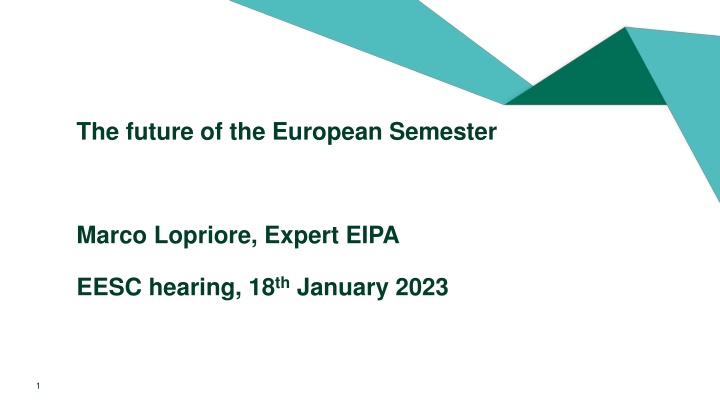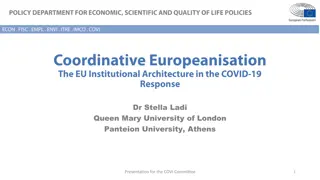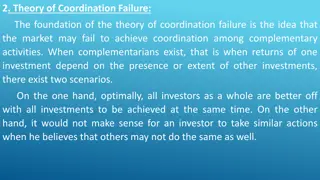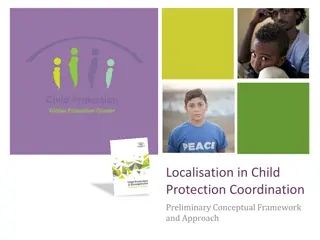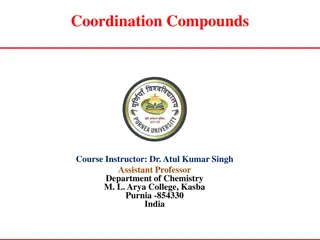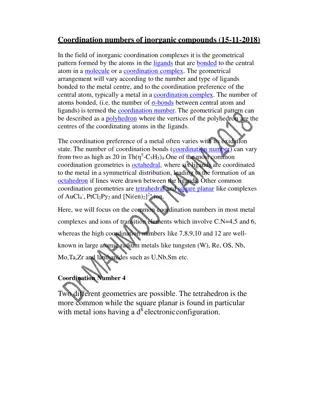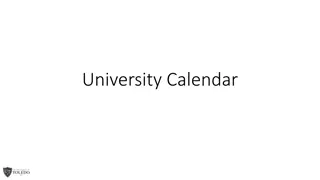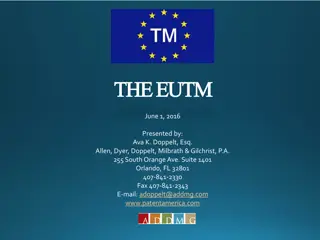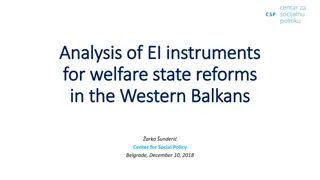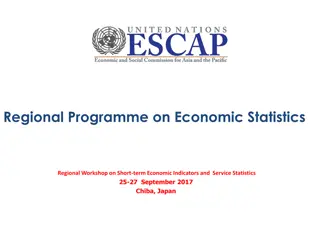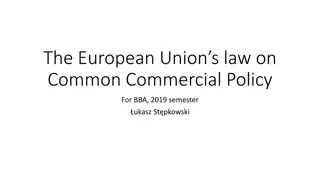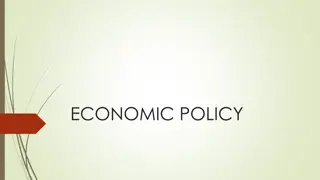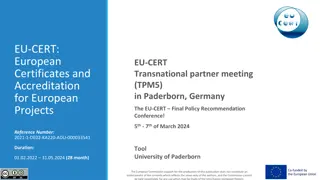The Future of the European Semester: Economic Policy Coordination in the EU
The European Semester is a framework for coordinating economic policies in the EU, focusing on fiscal sustainability, macroeconomic imbalances, structural reforms, and investments. The cycle involves key steps at both the EU and national levels, with pros and cons identified in its implementation. The European Semester also interfaces with EU funds like the ESF+ to align interventions with identified challenges.
Download Presentation

Please find below an Image/Link to download the presentation.
The content on the website is provided AS IS for your information and personal use only. It may not be sold, licensed, or shared on other websites without obtaining consent from the author.If you encounter any issues during the download, it is possible that the publisher has removed the file from their server.
You are allowed to download the files provided on this website for personal or commercial use, subject to the condition that they are used lawfully. All files are the property of their respective owners.
The content on the website is provided AS IS for your information and personal use only. It may not be sold, licensed, or shared on other websites without obtaining consent from the author.
E N D
Presentation Transcript
The future of the European Semester Marco Lopriore, Expert EIPA EESC hearing, 18thJanuary 2023 1
The European Semester: economic policies are a matter of common concern (Semi)-annual coordination: EU MS align their budgets/economic policies with the objectives/rules agreed in EU level cycle of economic (employment/social) and fiscal policy The 4 main goals: Ensuring sound sustainable public finance (SGP) Prevent excessive macroeconomic imbalances in EU Supporting structural reforms for jobs & growth (Europe 2020, Green Deal, SDG, ESPR) Boosting investments
Key steps in the European Semester Cycle November (N-1) EC Autumn Economic Forecast Alert Mechanism Report (AMR) Annual Sustainable Growth Survey (ASGS)/SMPR Draft Budgetary Plans Opinion (DBP) Euro-area Recommendation EU LEVEL July CSR adopted by ECOFIN December (N-1) Bilateral meetings with MS / fact-finding missions MS adopt budgets June CSR endorsed by European Council CSR discussed in Council February EC Winter Economic Forecast May Country Reports In-Depth Reviews EC Spring Economic Forecast Country Specific Recommendations (CSR) proposed by EC March European Council adopts ASGS priorities April National Reform Programmes (NRP) Stability or Convergence Programmes (SCP) NATIONAL LEVEL
Pros and Cons in the European Semester Pros/Merits Part of it is binding: sanctions of SGP/MIP Cons/Drawbacks No sanctions if off track ; (more recommendations, warning); no naming and shaming Low absorption rate; Macro-economic conditionality Cherry picking of CSR by MS CSR central in link to EU budget such as Cohesion High level political commitment European Council endorsement Joint EC-MS production. Iterative process between EC and MS with feedback loops Dominance of core DGs in EC Administrative Burden; Comply or explain not always transparent; Lack of stakeholder involvement challenges of communication NRP no binding template: limited comparability; Structural reforms do not have targets, thresholds nor sanctions Publicly available documents Clear thresholds in SGP and in MIP (14 indicators 14 AMR)
The European Semester and EU Funds The case of the ESF+ 2021-2027 Art 7: MS to programme ESF+ by prioritizing interventions that address the challenges identified in the European Semester, including in their NRP as well as in the relevant CSR adopted in accordance with Article 121(2) and Article 148(4) TFEU, and take into account the principles and rights set out in EPSR and the national and regional strategies relevant for ESF+ objectives, thereby contributing to the goals set out in Article 174 TFEU. Allocate appropriate resources to challenges of CSR Art 9: When CB of social partners and CSO is identified by a relevant CSR adopted in accordance with Article 121(2) TFEU and Article 148(4) TFEU, the concerned MS shall allocate an appropriate amount of at least 0.25% of ESF+ resources for that purpose. Art 12 : support for CSR/EPSR under any ESF+ Specific Objectives
Future prospects for the European Semester Integrating the RRF process with the European Semester National MT fiscal/structural plans (EC proposal nov 2022) and annual CSR Maintain link with EU funds (ESI, TSI,etc) Streamlining and overburdening the Semester Work on partnership and involvement of stakeholders Transparency, visibility and communication 6
Thank You! m.lopriore@eipa.eu
